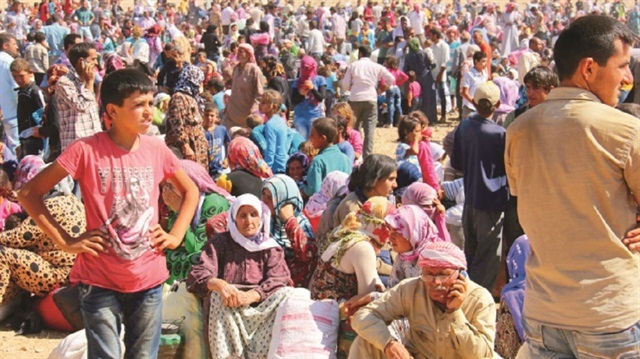
Of the 4.5 million refugee population in Turkey, 3.5 million are Syrian refugees who fled the raging civil war in their country
Turkey alone hosts half of Syrian refugees abroad, making it the country with the highest number of asylum seekers in the world with 4.5 million currently living there, according to recent data.
Of the 4.5 million refugee population in Turkey, 3.5 million are Syrian refugees who fled the raging civil war in their country, which placed a heavy burden on Ankara as it shielded Europe from an even worse migration crisis.
During the Tehran summit last week, Turkish President Recep Tayyip Erdoğan said Turkey has reached its capacity in taking in refugees, signaling Ankara’s reluctance to admit more migrants in the event of an influx from Syria’s Idlib region.
The president of Turkey, Russia and Iran met to discuss the fate of Idlib as rival factions there prepared for what could be the Syrian conflict’s last great battle.
In his remarks in Tehran, Erdoğan said any attack on Idlib would result in a disaster and that millions of civilians there would be moving toward the Turkish border.
The Syrian regime has recently announced plans to launch a major military offensive in the area, which has long been controlled by various armed opposition groups.
The UN warned earlier this week that such an offensive would lead to the "worst humanitarian catastrophe in the 21st century."
While Turkey hosts the largest number of refugees overall at 4.5 million, neighboring Lebanon is home to the highest percentage of refugees per capita.
Coming in second and third place, Pakistan and Lebanon each host 1.6 and 1.1 million refugees, respectively.
Meanwhile, with its population of over 300 million, the U.S. only hosts 271,000 refugees compared to Jordan, Egypt and Sweden which each host 650,000 226,000 and 169,000 people, respectively.
As thousands of Syrian continue to return to their country following Turkish operations that cleared their towns and cities from terror elements, 40 camps were set up by Turkish NGOs in Syria that currently house 30,000 refugees.
In recent days, Turkey has ramped up its preparations to meet the needs of additional refugees as it braces for a possible wave of a mass migration in the case of an attack against Idlib.
With 6.1 million externally displaced Syrians in diaspora, Turkey alone hosts over 3.5 million, more than double the number of refugees than the whole of the EU.
Due to its proximity to the Turkish border and relative security throughout the civil war, the population of Syria’s northwestern Idlib province has swelled to 4 million after evacuation deals brokered with the regime forced hundreds of thousands of Syrian opposition fighters and their families to leave their hometowns, turning the previously sparsely populated region into a sanctuary for those opposing Assad.
Close to a million of Idlib’s population lives in close to 200 camps at ground zero near the Turkish border.
A possible attack against Idlib would trigger a wave of mass migration towards Turkey’s Hatay, which is a major source of concern for Turkey.
In addition to risking the lives of hundreds of thousands of civilians in Idlib, an offensive will trigger a migration wave of 2 million refugees bound for Turkey and Europe, which could see terrorist elements attempting to cross the borders among those seeking asylum, possibly compounding security concerns across the continent.
Turkey has been a main route for irregular migrants trying to cross into Europe, especially since 2011 when the Syrian civil war began.











